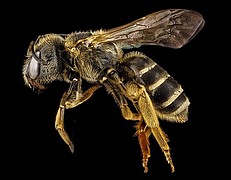Verdauungsprobleme bei Honigbienen? [30.04.20]
Bienen sind reine Vegetarier. Ihre wichtigste Nahrungsquelle sind der selbst gesammelte Nektar und andere Pflanzensäfte, für die Eiweißversorgung hingegen sind Bienen auf Pollen angewiesen. Hat ein Bienenstock nicht die Möglichkeit ausreichend Nektar zu sammeln, beispielsweise wegen klimatischer Gegebenheiten oder fehlender Artenvielfalt, müssen Bienen gelegentlich auf andere Nährstoffquellen ausweichen. Sogenannter Honigtau dient Bienen als eine solche alternative Nahrungsquelle in Krisensituationen. Die zuckerhaltige Substanz ist ein Ausscheidungsprodukt verschiedener Schnabelkerfen, zu denen auch Blattläuse gehören. Der darin enthaltener Dreifachzucker Melezitose kann die Gesundheit der Bienen jedoch gefährden; neben Haarverlust und abnormalen Verhaltensmustern wurde sogar der Kollaps ganzer Bienenstöcke beobachtet. Eine gerade veröffentlichte Studie der Universtäten Hohenheim und Wuppertal geht diesem Phänomen auf den Grund.Originalpublikation
Seeburger, V.C., D’Alvise, P., Shaaban, B., Schweikert, K., Lohaus, G., Schroeder, A., Hasselmann, M., 2020. The trisaccharide melezitose impacts honey bees and their intestinal microbiota. PLOS ONE 15, e0230871. doi.org/10.1371/journal.pone.0230871
Abstract
In general, honey bees (Apis mellifera L.) feed on honey produced from collected nectar. In the absence of nectar, during certain times of the year or in monocultural landscapes, honey bees forage on honeydew. Honeydew is excreted by different herbivores of the order Hemiptera that consume phloem sap of plant species. In comparison to nectar, honeydew is composed of a higher variety of sugars and additional sugars with higher molecular weight, like the trisaccharide melezitose that can be a major constituent of honeydew. However, melezitose-containing honey is known to cause malnutrition in overwintering honey bees. Following the hypothesis that melezitose may be the cause for the so called ‘honeydew flow disease’, three independent feeding experiments with caged bees were conducted in consecutive years. Bees fed with melezitose showed increased food uptake, higher gut weights and elevated mortality compared to bees fed a control diet. Moreover, severe disease symptoms, such as swollen abdomen, abdomen tipping and impaired movement were observed in melezitose-fed bees. 16S-amplicon sequencing indicated that the melezitose diet changed the species composition of the lactic acid bacteria community within the gut microbiota. Based on these results, we conclude that melezitose cannot be easily digested by the host and may accumulate in the hindgut. Within cages or during winter, when there is no opportunity for excretion, the accumulated melezitose can cause severe intestinal symptoms and death of the bees, probably as result of poor melezitose metabolism capabilities in the intestinal microbiota. These findings confirm the causal relation between the trisaccharide melezitose and the honeydew flow disease and indicate a possible mechanism of pathogenesis.


